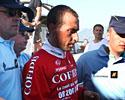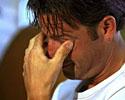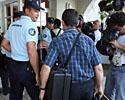
Recently on Cyclingnews.com |
An interview with Anne Gripper Part 1, August 1, 2007
Getting a grip on doping

|
The past year has seen an acceleration in the fight against the use of performance-enhancing substances, with the Operación Puerto and the Floyd Landis cases acting as a major catalyst. Australian Anne Gripper has been involved in co-ordinating the UCI's anti-doping measures and talked to Cyclingnews' Shane Stokes about the issue.
UCI anti-doping manager Anne Gripper has been in the news a lot recently, not least because of the Michael Rasmussen case at the Tour de France. When challenged by journalists about his missed tests, he told them during a rest-day press conference that he had spoken to Gripper on April 2, 2006 in order to explain the delay in communicating his wheareabouts details. However it emerged that she did not take up her role until several months later.
Since beginning with the UCI on October 17 last year, Gripper has been involved with a number of important introductions to the governing body's anti-doping programme. She played an important role in the 100% Against Doping programme launched earlier this year, a project to greatly increase the amount and sophistication of in-and out-of-competition tests. Gripper was also involved in the Rider's Commitment for a New Cycling initiative, whereby riders were asked to sign a pledge that they were not in any way involved with Operación Puerto or any other doping cases, agreed to give a DNA sample if required, and undertook to pay a year's salary if they tested positive or were otherwise implicated in doping.
Following the Landis and Operación Puerto cases last season, UCI president Pat McQuaid vowed that the organisation would clamp down and adopt a zero tolerance approach to the problem of doping. While ASO claim that UCI rules should have prevented Rasmussen from starting - a claim McQuaid denies - it can be said that the whole expansion of in- and out-of-competition testing by the UCI and others has greatly increased pressure on riders trying to break the rules. Paradoxically, because these efforts to stamp out doping have led to increased detection, they have in turn generated more negative headlines during this year's race.
"Our argument is that it is fine to have a strong anti-doping programme, but is important to deal with the consequences as well."-Anne Gripper says bad publicity comes with the territory of busting cheats |
When asked if this represents a plus or minus for the sport, some people are dejected by the big name doping news. Others have been more optimistic, saying that it can only been seen as a good thing to catch and sanction those who would take banned substances. So what's Gripper's stance?
"I guess I am more in favour of the second viewpoint,” she replied. "The announcement of a positive case shows that there is a strong anti-doping programme during the Tour. We are testing for every single possible substance from which detection is available. The strength of the programme is going to give us some consequences and as a sport we are going to have to accept those consequences. We must recognise that those riders who continue to choose to go are being removed from the event and from the sport, and that has to be a good thing.
"I really believe that there are far more riders riding this year's Tour fairly and cleanly, and that the anti-doping programme is really helping us to finally weed out those who have chosen to do it in another way," she added.
Apart from those being caught for doping, there also seems to have been an effect on the racing during the event. Several big name riders have performed erratically, while the overall pattern of the racing seems a little different. Gripper feels that out of competition testing has increased the pressure on those who wish to use drugs. "We have been watching performances, watching how riders compete in each race,” she said. "I guess that helped us with our out of competition programme [prior to the Tour de France]. We are also getting comments that the Tour does seem to little bit slower this year that has been in the past. That's interesting, although it is quite anecdotal.”

|
On the subject of out of competition tests, Rasmussen's four warnings have attracted a lot of attention during the race. He was given two by the UCI and two by the Danish national anti-doping agency, falling just short of the three warnings by either which would have led to a sanction of up to 18 months. Cyclingnews spoke to Gripper prior to his exclusion from the Tour; at the time, while she said that she felt it was correct to allow Rasmussen to start, the developments during the race meant that the UCI was looking into the possibility of disciplinary action. That chance of further action being taken will have increased with the news that he was in Italy rather than Mexico, and had reportedly admitted lying to his team. He was consequently removed from the Tour.
"My view is that on the 29th of June when we issued him with a final warning letter, it was not appropriate to open disciplinary proceedings at that point,” Gripper said. "The final warning letter was really making it very, very clear that one more issue with either providing his whereabouts information or not being where he said he was going to be would result in the opening of disciplinary proceedings. What I can say is that the week before the Tour de France, there was no reason to open disciplinary proceedings against him then."
Since that pre-Tour period, he's been accused by a former friend of trying to get him to transport doping products unawares, and has also left the Tour under a cloud, being fired by his team. Gripper said the UCI were going to investigate the trafficking claim further.
"Yes, we have already started considering the most effective way of obtaining that information," she said. "In cases like this where there is at least one witness and possibly other witnesses who offer to provide information, we have to be really carefully as regards the process that we use to obtain that information. We are seeking advice at the moment about the most effective way of doing that.” The news that he may have actually lied to the UCI about his whereabouts makes things more serious again; if this is shown to be the case, it is very possible that he will be suspended.
Gripper is doubtlessly frustrated by the breakdown of relations between the UCI and ASO, the organisers of the Tour. She feels that to expect a race without any positive controls is not realistic, especially as the climate within the sport is still going through a process of change. "Our argument is that it is fine to have a strong anti-doping programme, but is important to deal with the consequences as well," she noted. "You can't run away from the consequences. There certainly was a lot of testing carried out in the race, in fact some 760 tests were carried out showing how the anti-doping effort has been ramped up. "During the Tour itself we are doing 400 pre-stage blood screens, 140 post-stage urine tests and 40 post-race blood controls. That's in addition to the 180 out of competition tests done in the weeks leading up to the Tour.”
Team and federation responsibilities

|
Prior to the start of the Tour de France it emerged that Alexandre Vinokourov was working with the controversial doctor Michele Ferrari. At the pre-race press conference of the Astana team it was put to Vino that Ferrari's ‘sulphurous' reputation and suspicion of doping practices raised many questions about the Kazakh's own stance on the matter. Vinokourov insisted that he was clean, that he had done nothing wrong and that Lance Armstrong had never faced questions when he worked with Ferrari. Journalists pointed out that the American had actually been under scrutiny because of this.
Astana team manger Marc Biver was equally unapologetic. His attention was drawn to Astana's own code of ethics, which said that riders cannot work with doctors from outside the team. "Michele Ferrari is not the doctor of Alexandre Vinokourov, but is his trainer,” he said. Two weeks later Vinokourov tested positive for a blood transfusion and the team were asked to leave the race.
Gripper said there are ways to prevent the need for riders to work with doctors such as Ferrari. "One of the strong message is that the ProTeams were given at that meeting on the 19th of June directly from Pat [McQuaid] is that it is the responsibility of the team managers to absolutely ensure that their riders are getting all of their support services from within the team," she said. "He very strongly urged the teams to be very, very conscious of which professionals the riders were consulting, and to introduce measures whereby the riders had to advise of every single professional preparatore or trainer that they consulted.
"We are working with the ProTeams to really get that [to sink] in. Pat's other message is that the ProTeams have to set up a good system within their own team, with all the expertise that riders might need," she added. "Basically, from nutrition, physiology, psychology…urging the teams to actually set those systems up."
Who is Anne Gripper?
Anne Gripper is a former competitive triathlete with a long-running involvement in cycling. She has a strong background in sport, having worked within the Australian Sports Commision/Australian Institute of Sport in the area of human resources, the Women and Sport unit and the manager of Active Australia, then going on to spend six years doing several high-profile roles within the Australian Sports anti-doping authority. These included the position of manager of drug testing and education.
She moved to Switzerland in 2006 to do a masters in sports administration but shortly before she was due to relocate to Australia, she began talking to the UCI and was offered the role of anti-doping manager. She started last October and while she describes the job as a challenging one, she also takes encouragement from the steps forward such as the 100% Against Doping and Riders’ Commitment to a New Cycling initiatives. |
At the moment, the UCI cannot forbid riders from working with controversial doctors and trainers, but this could change soon. "It is voluntary at the moment," confessed Gripper. "But we are looking at some rule changes that might make it a little bit easier. Predominantly it [enforcing such a rule] will be done through the team Code of Conduct and the team employment engagement with their individual riders. It is the teams who have the right to control the actions of their riders. At the moment, the teams have more power in this area.”
Gripper also addressed the case of Alessandro Petacchi case. The Italian failed a doping test during the Giro d'Italia, due to the fact that he had a salbutamol level which was over the WADA threshold. Once this occurs the onus is on the athlete to prove that there is a legitimate reason why he or she was over the 1000 ng/ml; the Italian National Olympic Committee (CONI) recommended to the Italian Cycling Federation (FCI) that the sprinter be banned for 12 months, but instead the FCI cleared him. This follows on from some other unusual decisions in the past. For example, the UCI was known to be unhappy with the FCI's swift initial clearing of Ivan Basso, several months before he finally admitted that he had worked with Eufemiano Fuentes.
In recent days CONI announced that it would appeal the decision; prior to that, Gripper had said that the UCI would also look at the case and see if there were grounds to look for a re-examination. "The situation is that we closely examine any decision which comes to us which is not in alignment with our rules,” she stated. "We request the full file, the basis of the decision. And the UCI has the right to appeal the decision of the national federation to the Court of Arbitration in Sport. As regards the Petacchi case, we were surprised at the decision. We will request the file from the Italian federation; we will review that very carefully before we make a decision as to whether the judgement has been properly made or not.”
One way to avoid any perception of a conflict of interest is for a body other than the rider's own federation to deliberate on such cases. "It is interesting that a lot of the national anti-doping organisations are moving towards that way,” she says. "They are setting up their own independent hearing body, rather than the more traditional approach of doing the initial investigation and then sending the cases out of the national federations to examine. That is something that more and more international federations will have to look at as well.

|
"The US is a good example where there is a NADA, a national anti-doping agency and it uses an independent hearing body called the triple A, the American Association of Arbitrators, to actually hear its cases," explained Gripper. "That means that USADA can be a clear prosecutor, where as in most national programmes the case is still forwarded to the relevant national federation for whatever sport it is. Then the national federation is expected to prosecute the case against their own athlete.
"A similar thing happens with us," she adds. "We send the case out to the national federations and then expect them to conduct the hearing, and if necessary prosecute the case against their own riders.” The suggestion is that this system may change in the future due to the obvious problems that can crop up; a rider may have strong links to those within the federation which is charged with punishing him, lessening the chance of objective action. Equally, there is a chance that the national federation could shy away from punishing someone who will be their strongest competitor in Grand Tours, world championships or Olympic Games. It's not always easy - or desirable - for a federation to send a national hero down. The introduction of an independent body such as the AAA would seem to be a step forward in this respect.
Moving on to the next level

|
Another step forward for the anti-doping fight is the establishment of the Movement for a Credible Cycling union. This comprises the French teams Bouygues Telecom, Crédit Agricole, Cofidis, Française des Jeux, Ag2r-Prévoyance and Agritubel, as well as German squads T-Mobile and Gerolsteiner. The initiative came about immediately before the start of the Tour in London when the teams concerned became disillusioned with the lack of intent shown by some other teams vis-à-vis the enforcement of the ethical code, and the general fight against doping. These teams have pledged to show complete transparency and to introduce additional measures to further a clean sport.
In Gripper's eyes, this is a good thing. "I think that those teams have really made a definite stance,” she said. "They want to take the lead amongst the teams themselves in demonstrating both the practical and moral commitment to anti-doping, and to ridding the sport of drugs. They seem to be really looking at all sorts of ways that they as team managers and teams can change the culture of the sport. The more teams that consider this issue really seriously and take ownership of the issue and want to actively do something about it, then the better it is for the overall sport.”
The future of two of the teams concerned appears to be under question due to the positive tests of two riders who appear to have been working outside the team environment. Both Patrik Sinkewitz and Christian Moreni failed testosterone examinations and this could potentially lead to an early end in the sponsorship of T-Mobile and Cofidis. If so, it would be a setback for the fight against doping as these two teams have been very forward about the need for change. Indications are that team management in both cases are pushing for a clean sport and so for one or both to stop because of what Sinkewitz and Moreni chose to do would be very unfortunate.

|
"The announcement of that test [Sinkewitz] was the wrong rider, the wrong time, the wrong country and definitely the wrong team," said Gripper, when asked of her thoughts on the uncertainty over T-Mobile's future. "It certainly has been a setback to T-Mobile and the efforts that they have been making. From a team management perspective, it appears that they are still really keen to continue doing what they are doing.
"There is an argument that it is one of the teams that is doing a lot more testing, is organising the German national body to go and test their riders in training camps and out of competition," she notes. "There is always some irony in the fact that the more testing you do, the more likely you are to get positive results. T-Mobile organises a lot more testing, and this makes them more prone to having positive results. Again, it is a bit of a dilemma as to how to respond to that particular result.
"I think it is important if T-Mobile decided to stay on as a sponsor," added Gripper. "It would be good for them to continue on the fight against doping that they have been making.”
Read Part II of the Anne Gripper feature. It deals with many more issues in the anti-doping fight, including the Men in Black situation and UCI's relationship with WADA.
